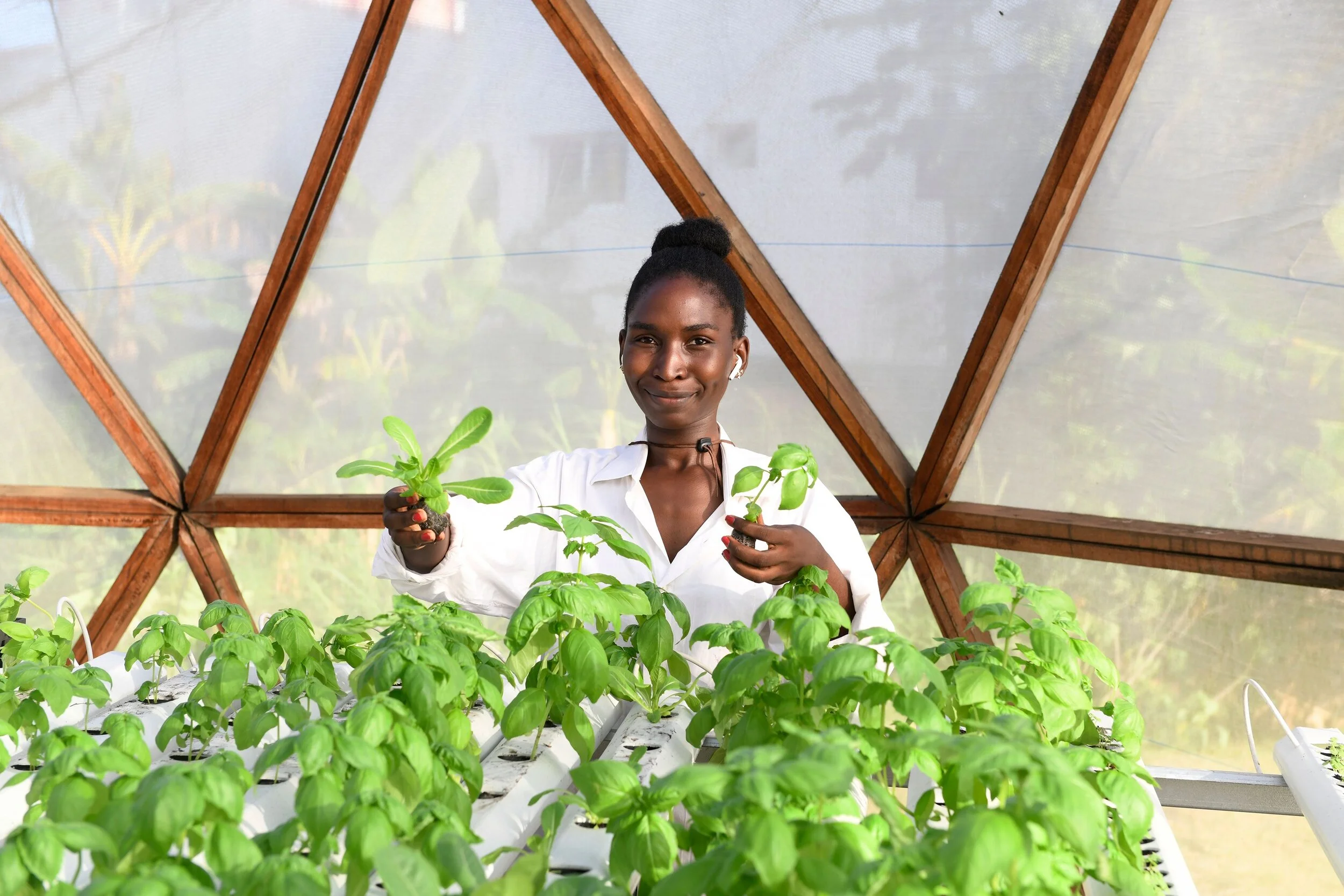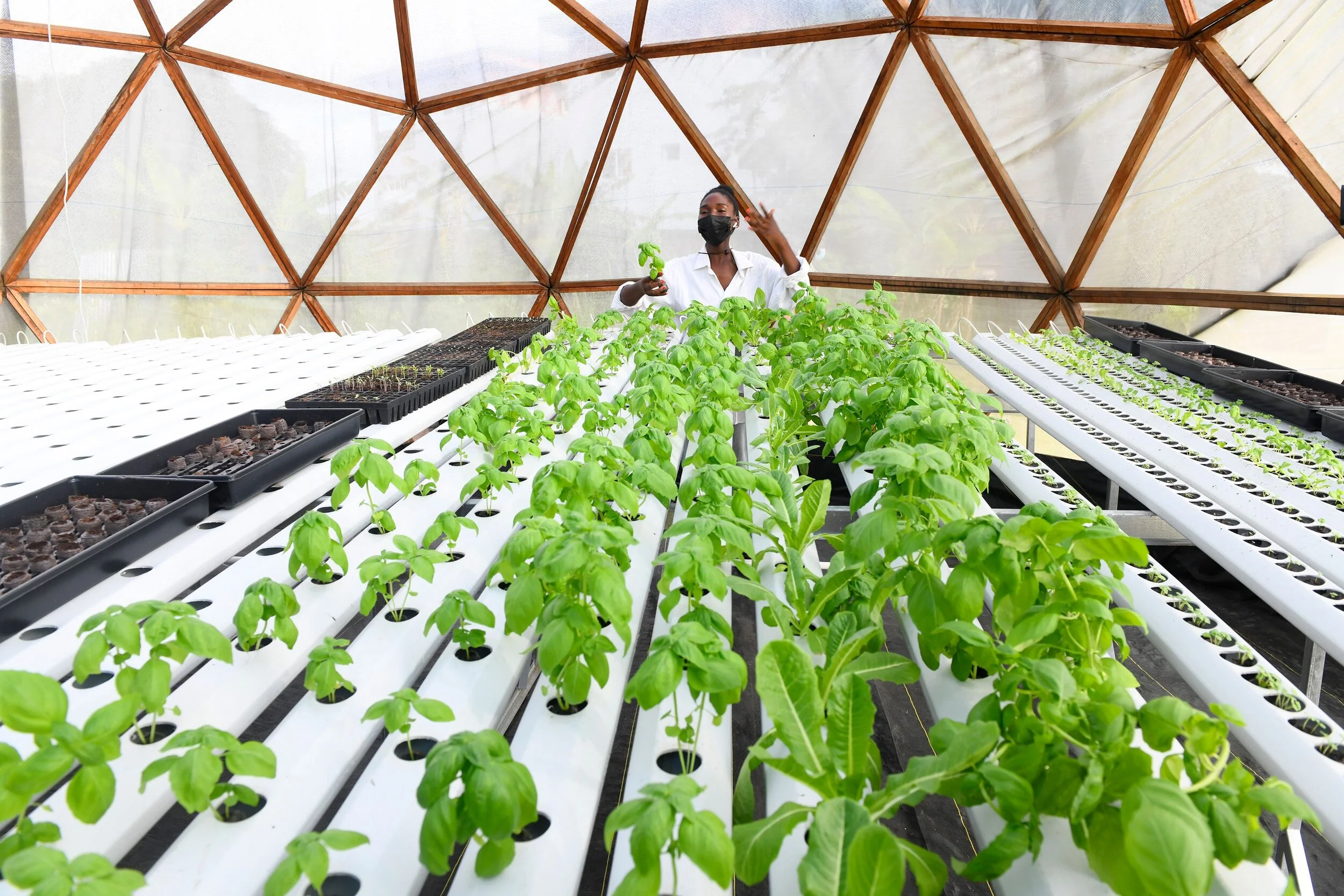Jun 2, 2021
Meet The Female Entrepreneur Changing Gabon’s Food Systems

Image sourced from La Ferme Urbaine Okoume
Editor’s note: The following information is derived from an interview Agritecture conducted with Claudia S. Ondo, Owner & General Manager at La Ferme Urbaine Okoume. Visit their website or contact the team to learn more about or to partner with La Ferme Urbaine Okoume.
From College To Agricultural Entrepreneur
After completing her studies in Political Science at the University of Montreal, Claudia S. Ondo was contemplating the next phase of her adventure in order to make a positive impact on global politics, the environment, and on communities.
After spending that summer in Libreville, she was dumbfounded with the discovery that her native country of Gabon was extremely dependent on food imports. She highlights that “local agricultural production covers less than 35% of [the population’s] needs, and food imports are growing by 11% each year.”

Image sourced from La Ferme Urbaine Okoume
Claudia shares that “Gabon is a very small country - small population, only about 2 million inhabitants - but, a rich country in terms of resources. We have lots of wood and oil, so most of the working population is directed to the public and private sectors. The agriculture sector is left out.”
Drawing from her political science education, she saw an opportunity to offer the Gabonese people a sustainable agricultural model that not only “met this need for local fruits and vegetables, but also offered up a solution for youth unemployment and encouraged the Gabonese people to take an interest in agriculture.”
L’agriculture De Demain, Ca Se Cultive Maintenant (Cultivating The Agriculture Of Tomorrow, Today)!
Whilst small in scale (only 10 meters in diameter), La Ferme Urbaine Okoume’s hydroponic microfarm produces an astonishing 300 lettuces and herbs per week. Claudia comments that the farm produces “mostly lettuces, romaine and iceberg, alongside parsley, coriander, basil, oregano, and arugula.”
Alongside this technological approach, the team at La Ferme also wanted to take advantage of Gabon’s rich soil and weather conditions. “We have an experimental garden in which we grow tomatoes, green onions, lettuces, and now zucchinis too.” This garden is experimental because the team is still testing out rotating crops throughout the year, depending on seasons.
The team not only prioritizes local production, they also want to deliver organic produce. With a mix of hydroponic and greenhouse set-ups, the farm is also still able to utilize natural sunlight, and collect rainwater for the crops.
Claudia shares that produce brought into Gabon is not supervised, and, as a result, you can’t trust the quality. “We don't know where it comes from. We don't know what has been used. What is the process? How has it been cleaned?” This is a huge reason that customers come to La Ferme Urbaine Okoume.
The key was to form a stronger relationship between the Gabonese people and urban agriculture. To Claudia, hydroponics seemed to be the perfect combination to achieve these goals, and to build greener cities and communities for future generations.
The team calls it their “little green paradise.”
So far, the farm has been able to add to the neighborhood a place for relaxation, and positive thinking. “It allows many city dwellers to reconnect with nature, agriculture, and the process of growing a plant. What does a tomato plant look like? What does a seedling look like? How are in-soil crops like carrots, potatoes or onions harvested?”
The construction of this farm is encouraging curiosity. Today, more and more people are contacting La Ferme Urbaine for viewings, schools are desiring workshops, individuals are coming in to learn how to grow their own plants at home, and restaurant owners are delighted to know where their products come from.”
Claudia and the La Ferme Urbaine team are grateful to Agritecture for making their dream a practical reality.
Having studied agribusiness in university, Claudia had tons of practical knowledge on how to transform an idea into a business. But, what she didn’t have was the agricultural knowledge and expertise in hydroponics and urban agriculture.
After being awarded a grant by The World Bank, Claudia knew she needed more agricultural expertise to tackle this vast mission of transforming Gabon. Whilst Claudia initially looked for a local company, after stumbling across Agritecture in a newsletter, she felt an instant connection. She not only found a team with shared values, but also one with international agricultural expertise. This was key to her given the Gabonese context.
With over 6 years of experience in agriculture, specifically between the North American and MENA-GCC region, Agritecture’s Director of Operations, Yara Nagi, shares her experience working with La Ferme Urbaine. “Agritecture guided Claudia on equipment selection, the bill of materials for the farm, and management planning. The model was to grow fresh, local lettuces and herbs that are not available in that same quality to restaurants, hotels, and public markets. Guiding clients on making the best use of their grant money and avoiding costly mistakes fits within our social mission to help young farmers make a positive impact on their community.”
On her experience working with Agritecture, Claudia adds that “as someone who had a political & agribusiness background, but no prior agricultural experience, Agritecture really gave me the assurance and guidance I needed in this new business and adventure.”
Since being hit by the pandemic, the farm still runs 24/7. However, they’ve changed their primary clientele. Today, they serve more restaurants than hotels. Claudia adds that “95% of our customers are restaurants. 5% are just individuals who want fresh products.”
Additionally, the team has come into contact with the Sylvia Bongo Ondimba Foundation run by the First Lady of Gabon, Sylvia Bongo Ondimba. The two teams have come together to scale up urban farming in the region and create more revenue streams for locals.
Not only this, their partnership empowers women by highlighting how young women in Gabon can run their own businesses.
Claudia shares that “this field was thought to be exclusively for a certain category of people, so, the fact that it’s a women-led business speaks volumes. We’re often congratulated by our customers when we deliver lettuce in stores or to restaurants, because they’re surprised to see women in farmer outfits.
Yara shares that what makes this farm and team unique is “the vision of the entrepreneur, Claudia. It is always incredibly inspiring to see women of our generation lead agricultural projects like these, but this project in specific has a vision of shifting the local food system and making produce more accessible. I think there are many more projects like these to come.”




